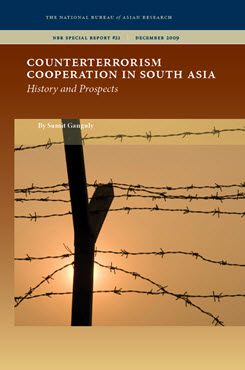NBR Special Report no. 21
Counterterrorism Cooperation in South Asia
History and Prospects
This report examines the prospects and challenges for effective regional counterterrorism cooperation in South Asia.
EXECUTIVE SUMMARY
MAIN FINDINGS
- Two discernable patterns emerge from the cases of terrorism in South Asia. First, these cases all involve indigenous uprisings that turned to the use of terrorism. Second, every case saw external intervention frequently exacerbating the original conflicts, prolonging their duration, and dramatically expanding their scope.
- There are few examples of effective regional counterterrorism cooperation in the region. South Asian states have been more prone to use terrorist proxies to achieve foreign and security policy goals rather than evince any willingness to engage in viable counterterrorism cooperation.
- Weak regional institutional frameworks, the long history of discord, conflict and distrust among the South Asian states, and organizational weaknesses of counterterrorism capabilities present significant barriers to regional counterterrorism cooperation.
- The prospects of counterterrorism cooperation in South Asia are distinctly mixed. Though the possibilities for Indo-Pakistani counterterrorism cooperation in the foreseeable future are negligible, there are limited prospects for cooperation between Bangladesh and India, Sri Lanka and India, and Nepal and India.
POLICY IMPLICATIONS
- No South Asian state, of its own accord, can devise a mechanism to overcome the considerable challenges that thwart regional counterterrorism cooperation. External actors such as the U.S. and the EU may be required to play a substantial and sustained role to initiate such a process.
- Sustained pressure on Pakistan is needed to shift Islamabad’s policy position regarding the use of jihadi forces against India to attempt to wrest control of the disputed state of Jammu and Kashmir and to exploit existing Hindu-Muslim tensions within Indian society.
- There is potential for external actors, such as the U.S. and the EU, to play a role in assisting South Asian states with the functional features of policing and counterterrorism cooperation, such as training, border control management, electronic surveillance, and intelligence-sharing.


